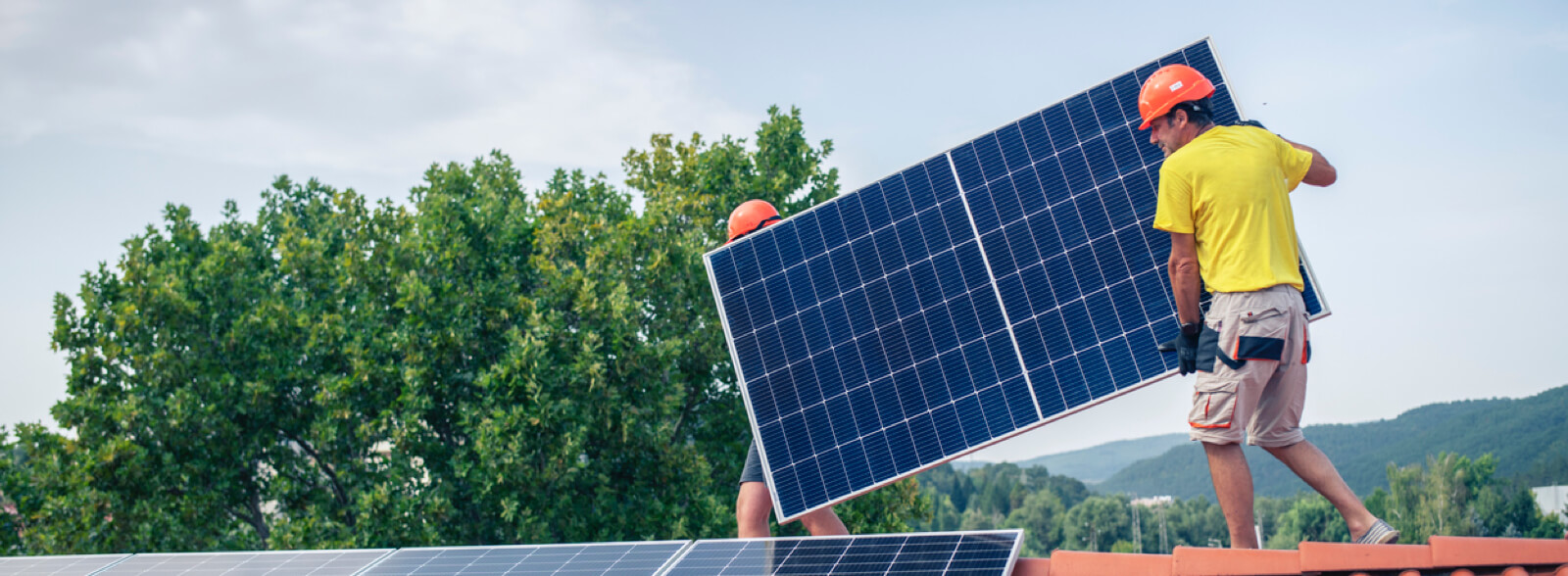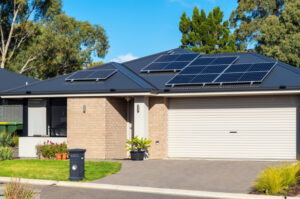How To Go Solar

Today’s solar energy is highly efficient, powering systems that can heat your water, supply your electricity, and even offset your home heating system. Solar panels are one of the most popular renewable energy home improvements available to homeowners today.
There are federal and state incentives available to individuals and businesses seeking to use solar energy.

Solar panels are one of the most popular renewable energy home improvements available to homeowners today. The panels emit no harmful greenhouse gases and can lower homeowners’ energy bills in the long term.
How Solar Panels Work
Solar photovoltaic panels contain cells that convert the photons from sunlight into electrical current. Generating enough electrical power for your home generally requires several solar panels operating together.
Solar panels can be used with batteries that can store electricity for use when sunlight is not available. These batteries can be expensive. With or without battery storage, solar panels require “inverters” to convert the electricity directly produced by the panels into a form that can be used in the home. They also require controllers to ensure the electrical safety of the panels and the connected devices in your home.
Things To Consider Before Installing Panels
Whether you are installing solar panels as part of building a home or planning to install panels on an existing structure, review the building’s orientation. For homes in the northern hemisphere, it is usually best for solar panels to face south.
Consider the size of the system you’ll need, which is based on the amount of sunlight your home gets, how much energy you’ll need to run your home, the type of system you prefer (grid connected or stand-alone), and electrical safety concerns.
Make sure your home’s roof can support the weight of solar panels and that your roof gets enough sunlight. If your roof is shaded by trees, or if you rent an apartment or home, you may want to hold off on retrofitting your home with solar panels. If your property doesn’t lend itself to a solar energy system, you can always join a shared or community solar program.
Finally, take measures to reduce your home’s energy usage before installing solar panels. The amount of solar energy you will need to produce depends on how much energy you use. Make sure to do an energy audit and install energy-efficient products before adding solar panels.
Who To Hire for Installation
Given the complexity of solar energy systems and the need for proper installation, it’s wise to have a professional solar contractor install your system. When researching installers, look for insured professionals who have been Certified by the North American Board of Certified Energy Practitioners.
It’s usually best to get at least three bids for installing the system. Make sure the bids are based on the same specifications to enable comparison shopping. Bids should clearly state the following information:
- The maximum generating capacity of the system, measured in watts (W) or kilowatts (kW).
- An estimate of the amount of energy that the system will produce on an annual or monthly basis (measured in kilowatt-hours).
- The total cost of getting the system up and running, including hardware, installation, connection to the grid, permitting, sales tax, and warranty.
Here are other key considerations your installer should discuss with you:
- Where to place panels. It’s often preferable for panels to face south, but this depends on the location of the building and the pattern of electricity consumption. For example, south-facing panels may not be as effective for those who use more electricity in the mornings. Consider whether panels will be mounted on a rooftop, the ground, or elsewhere and how much sunlight these locations get.
- System size and output. The ideal system size and output will depend on your electricity use. Installers can usually calculate this using your utility bills. Consider whether your goal is maximizing cost savings or achieving net zero emissions. Virginia law limits system size to 25 kW. However, most residences are unlikely to exceed this limit.
- The condition of your roof. Ensure that your home’s roof is in good shape before installation. Take care of any roof repairs ahead of time as it can be expensive to remove the panels later. Also, have your roof evaluated to confirm that it can support the weight of the structure. It may need additional support before you can complete the installation.
The following links provide additional guidance on “going solar”:
- Appalachian Power’s Solar Energy
- Solar United Neighbors
- Solarize Virginia
- Solar Workgroup of Southwest Virginia
- U.S. Department of Energy’s Homeowner’s Guide to Going Solar and Homeowner’s Guide to the Federal Tax Credit for Solar Photovoltaics
System Costs and Financing Solutions
The costs of home solar energy systems vary depending on your home energy consumption and the size of the system. To determine the potential costs and output of a home solar energy system, consult with an installer or use solar mapping tools. These tools can also help you determine the best system size, estimate costs and savings, and find local contractors.
There are several ways you can finance a solar panel system for your home:
- Buying a System
If you have purchased a home solar energy system, you are the sole owner of the system. The system will be connected to the grid by your installer, and it will need an interconnection permit from the utility company.
If your solar energy system generates more power than your home needs, you can sell the surplus to the grid through net metering. If you need more electricity than the system provides, you will draw energy from the grid to make up for it. This is the best option for taking advantage of tax credits and increasing the market value of your home.
- Leasing a System
If you are paying to lease a solar energy system, you pay the system developer to use the electricity it generates. You do not own the system or the panels. Under a leasing arrangement, homeowners typically pay the developer a flat monthly fee that is based on the estimated amount of electricity that the system will produce. The developer is responsible for system maintenance.
In a leasing arrangement, the system owner — not the person paying the lease — receives state or federal tax incentives. However, the leasing company may pass on those incentives to you in the form of lower lease payments.
- Power Purchase Agreements
In power purchase agreements, consumers host solar energy systems owned by solar companies and purchase the electricity generated. The host consumer agrees to purchase the power generated by the system at a set price per kilowatt-hour over the life of the system.
The purchase price of solar electricity is often lower than the local utility’s retail rate. In this scenario, the developer arranges for the design, permitting, financing, and installation on a consumer’s property at little to no upfront cost.
Power purchase agreements are currently only available to customers of participating cooperatives and to qualifying low-income customers of Dominion Energy and Appalachian Power. As in a leasing agreement, the system owner receives state or federal incentives, and the solar company may pass on those incentives to you in the form of a lower cost per kilowatt-hour.
Offsetting System Costs
You can offset your solar energy system costs through net metering and tax incentives. However, only system owners, and not leaseholders or power agreement holders, can benefit from tax incentives.
Net Metering
Net metering is a system in which solar panels or other renewable energy generators are connected to a public utility power grid and surplus power is transferred to the grid, allowing customers to offset the cost of power drawn from the utility. When homeowners generate electricity from their solar panels, it reduces the amount of energy they need to purchase from their electric utility. If the solar energy system generates more energy than the home consumes, any excess power is sold to the grid and can be deducted from monthly energy bills.
Virginia’s net metering law applies to residential systems producing up to 25 kW.
Tax Incentives
As you research whether it’s viable to install solar panels at home, check whether your city or utility offers any rebates, tax credits, or other incentives that could reduce the overall cost of switching to solar energy. In addition, the U.S. Department of Energy provides an overview of federal energy tax credits available to consumers for the 2022 and 2023–2032 tax years.
The federal government offers renewable energy tax credits, which give qualifying taxpayers a credit of 26% of qualified expenditures for solar energy systems that were in service by 2022. This will drop to 22% for systems installed in 2023 and will expire in 2024. Get more information on how to qualify for this tax credit.
In addition, property tax exemptions allow businesses and homeowners to exclude the added value of a system from the valuation of their property for taxation purposes. Effective January 1, 2023, residential and mixed-use solar installations generating less than 25 kW are exempt from property tax.
Solar Renewable Energy Certificates
Solar renewable energy certificates (SRECs) are proof that renewable energy has been generated. These certificates are valuable to entities that want to prove they have invested in renewable energy. Solar owners can earn one SREC for every 1,000 kilowatts of electricity produced. Solar owners can work with their installer or broker to sell the SRECs created by their system. In Virginia, an SREC may be valued at up to $75. Prices vary from state to state and can fluctuate based on demand. The sale of SRECs can help solar owners generate additional income and shorten the time it takes to pay off the cost of installation.
Required Permits
Check to make sure you follow state and local permitting rules and regulations. Installers will typically handle any required permitting, so confirm with your installer that you are in compliance with state and local permitting rules and regulations.
Shared Solar Programs
In community or shared solar programs, participants pool their purchasing power to buy into a solar energy system. The solar energy system may be on- or off-site and may be owned by a utility company, a solar energy developer, a nonprofit, or multiple community members. You might consider this option if your home does not have adequate roof space for a solar energy system, if you do not want to be responsible for system maintenance, or if you are ineligible for federal and state tax incentives. To find out what community options are available, contact your electric utility.
As of 2023, Dominion Energy customers can participate in one of Dominion’s shared solar projects.